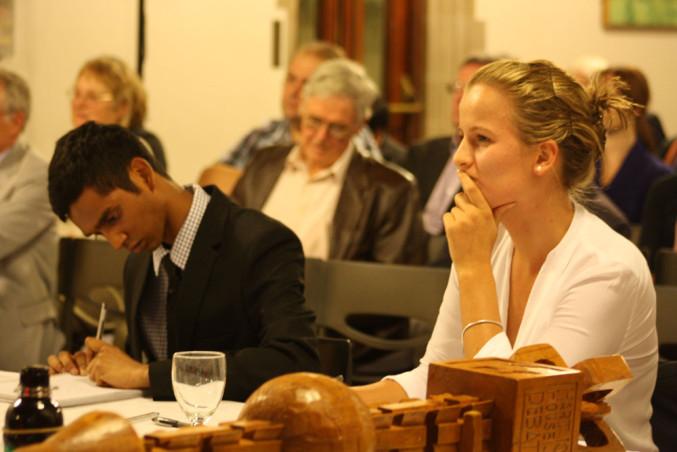By Melissa Myers
After a heated 45 minutes of discussion at the Hart House, Ryerson’s debate team lost to the University of Toronto on Wednesday, evening the score between the two schools 1-1.
The Canadian International Council Toronto Branch presented the Second Annual Foreign Affairs University Cup. Ryerson’s team was the winner at last years debate.
The debate question for the night was – ‘This house welcomes the decline of U.S. hegemony.’ Both teams discussed the fall of power in the United States.
Ryerson spoke in favour of the resolution with leader Jane Hoysak, third-year history major and president of the Ryerson History Society (RHS), presenting the first argument.
Hoysak opened with a comparison of prominent American figures from past and present to demonstrate a loosened morality in U.S. culture and leadership. She used the vanity of military spending in the U.S. against its citizen’s poor access to education and health care to validate the fall of dominant political power in America.
Videsh Brijpaul, second-year history major and vice president of external affairs for the RHS, complemented Hoysak’s argument. Both students are working towards Ryerson’s new Bachelor of Arts in History, which became a specialized degree during the 2012-2013 school year.
The U of T team countered by arguing that the U.S. has been instrumental in establishing the UN and that alternatives to U.S. fall in power could include the dominance of superpowers like China or Russia, both of which carry internal human rights records that pale in comparison to the U.S.
Justice Joy Fitzgibbon (representing U of T), Justice David MacKenzie, (representing Ryerson) and Justice Scott Young (representing the CIC) chose the Ryerson team as winners of the debate.
But their collective decision only counted as one vote. The audience voted 47-33 in favour of U of T.
The tie-breaking vote was cast by the speaker of the house and President of the CIC Toronto Branch, Jo-Ann Davis, who declared U of T to be the victor.
“I wasn’t convinced by the multi-lateral argument and they [Ryerson] didn’t answer the question of – ‘if not the US, then who?’” said Davis.
Although well researched, practiced and passionate, the Ryerson team seemed pressured in preparing their impromptu rebuttal and fell short in the firm delivery of their closing argument.
“In all fairness, U of T’s arguments were okay, but predictable and not nearly as effective as the Ryerson team,” said Arne Kislenko, the Ryerson debate team coach.












Leave a Reply